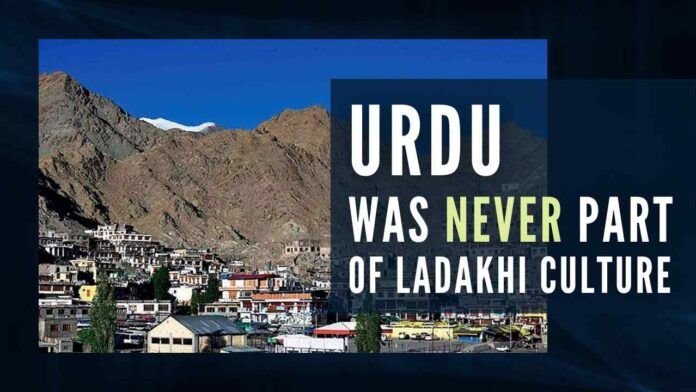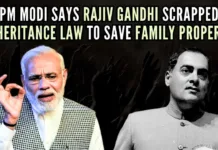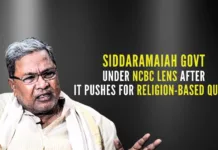
Ladakh removes mandatory requirement of knowledge of Urdu for recruitment of government jobs
On January 7, the government of UT of Ladakh took a big step to meet the age-old demand of the Buddhists. That day, the government issued a notification that amended the Ladakh Revenue (Subordinate) Service Recruitment Rule, 2021, omitting the criteria of “knowledge of Urdu language” for Naib-Tehsildar and Patwari posts in the revenue department. Hitherto, the qualification required for Level 6E (Naib Tehsildar) and Level 4 (Patwari) jobs in the revenue department was “graduation with knowledge of Urdu”. It has now been changed to graduation only.
The Buddhist activists had been repeatedly drawing the attention of the authorities to their age-old grievance that the compulsory criteria of knowledge of Urdu language had only helped the members of a particular community (read Muslims) to capture most of the Naib-Tehsildar and Patwari posts and barred the Buddhists from occupying such vital posts as most of them couldn’t read and write Urdu. The bulk of Buddhists speaks Bhoti, Hindi, and English.
The landmark decision of the Ladakh UT administration to remove the criteria of knowledge of Urdu language for the Naib-Tehsildar and Patwari posts has evoked response in the Buddhist-majority Leh district and Shia-majority Kargil district on expected lines. The cheerful Buddhists have welcomed the amendment. As for the Shiite Muslims, the Congress and the NC leadership, and Muslim activists in Kargil, they have all in one voice condemned the Narendra Modi Government and demanded that the amendment be withdrawn and the pre-January 7 regimes restored.
The Shiite Muslims, the Congress, the NC leadership, and Muslim activists have described the amendment as an attempt to “erode the culture” of Ladakhis, disempower the Muslims and create a rift between Buddhists and Muslims.
It would be only desirable to quote verbatim what Hassan Khan, former Deputy Commissioner of Kargil; Asgar Ali Karbalai, working president of the Ladakh Pradesh Congress Committee; and Haneefa Jan, Ladakh NC president, have said about the amendment. Khan has said that the decision to omit the knowledge of Urdu as a requirement for vacancies was “aimed at creating ideological division” between Leh and Kargil and that the Narendra Modi Government wanted to “disempower the Muslims”. “It is a brazenly communal move…,” he also said. Karbalai also said almost the same. “The decision to omit the Urdu requirement by the revenue department is aimed at creating a rift between Buddhists and Muslims in Ladakh…They (read Narendra Modi Government) think Urdu is the language of Muslims. It shows their hatred for Muslims,” said Karbalai. A Kargil-based activist Sajjad, among other things, reportedly said: “This order is an assault on our religious identity and an attempt to dilute the cultural history of Ladakh”.
As far as the Gupkar Gang’s NC is concerned, it accused the BJP of “depriving the youth of Ladakh (read Muslims) of employment opportunities” and urged the Ladakh administration to withdraw the “unfortunate decision”. The NC, in addition, accused BJP’s MP from Ladakh Jamyang Tsering Namgyal of “disrespecting the Urdu language” and claimed that “Urdu is a language of peace and love and those who believe in hate cannot understand this language and its beauty”.
The Muslim charge that the removal of the criteria of knowledge of Urdu language is an attack on the Ladakhi culture is as ridiculous as it is amusing and communally motivated. The main languages spoken in Ladakh are Bhoti, Shina, and Balti. Urdu was never a part of the Ladakhi culture. Even Hassan Khan admitted that “the revenue records of (Jammu and) Kashmir and Ladakh dating back more than a century – since the time of the British civil servant and author Walter Lawrence – have been drafted in Urdu”.
It needs to be underlined that Urdu was introduced in the erstwhile J&K State by the imperial and canny Britons only after they deposed Dogra Maharaja, Pratap Singh, in 1889 on the fictitious charge. The charge was that Pratap Singh and the Maharaja of Patiala had conspired against the British (mis)rule and that they had recovered from J&K “Maharaja Pratap Singh’s 23 letters against the British Government”.
The truth is that London condemned Maharaja Pratap Singh unheard and deposed him in 1889 because he had refused to concede the Britishers’ demands, including the demand seeking construction of military roads in J&K leading to the strategic Ladakh, including Gilgit, Baltistan, Hunza, Nagar, Yasin, Astore, Bunji, Punyal, and Ishkoman. London wanted military roads in these areas to check the Russian advance towards Afghanistan and promote its own imperial interests across Northern Frontiers at the cost of the Indian exchequer.
All this should put things in perspective and call the bluff of those in Kargil who have been opposing the January 7, 2022 amendment that redressed the grievance of the deprived Buddhists.
Tail piece:
On April 27 and 28, 1918, the All India Muslim Kashmir Conference held at Rawalpindi had passed several resolutions. One of the resolutions strongly opposed the introduction of Hindi in the J&K schools and offices. The resolution, inter-alia, said: “This measure (introduction of Hindi) will tend to create split among the Hindus and Mohammadans of J&K State” (Letter from Syed Mohsin Shah to Education Minister, No. 1186, dated 11-6-1918, JK Old English Records File No. 229/P-102 of 1918, State Archives Repository, Jammu). This shows that there is no difference between what the Shiite, the Congress, and the NC leadership said in Kargil about Urdu in January 2022 and what the All India Muslim Kashmir Conference said about Hindi 104 years ago in Rawalpindi.
Note:
1. Text in Blue points to additional data on the topic.
2. The views expressed here are those of the author and do not necessarily represent or reflect the views of PGurus.
PGurus is now on Telegram. Click here to join our channel and stay updated with all the latest news and views
For all the latest updates, download PGurus App.
- ‘Kashmir My core constituency’: Revisiting July 12, 2003 to understand politics, Omar Abdullah-style - March 15, 2024
- Total deviation from traditional approach: Seven takeaways from PM Modi’s March 7 Srinagar visit - March 9, 2024
- Status of political parties: Why is further J&K reorganization imperative? - March 1, 2024











Well done UT of Ladakh. It is ok to discriminate non-urdu speaking people all these years? Bunch of brain dead hypocrites.
Changes rather corrections to faulty precedents all though small beginning to happen. We just have to contend with such small moves.